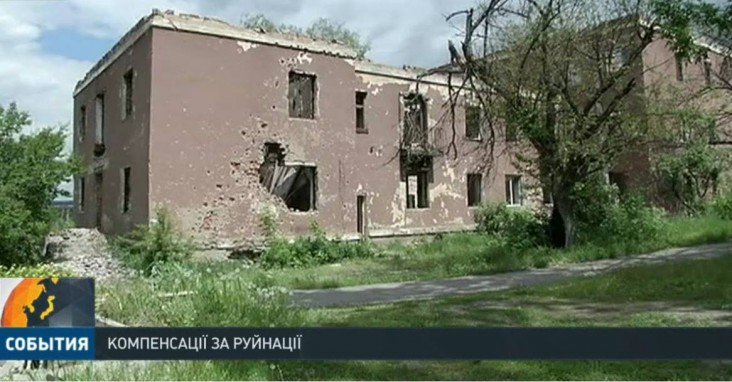
June 2016—Eighty-year-old Valentina M.* lived in the small rural community of Semenivka in Ukraine’s conflict-torn Donetsk region until military shelling during an anti-terrorist operation destroyed her home in 2014. In a groundbreaking case, Valentina won a court verdict to receive compensation from the Government of Ukraine for the damage inflicted on the house.
Valentina’s lawyers from the USAID Human Rights in Action project hope the case will set a precedent for others whose property was damaged or destroyed by military action.
After her village was almost completely razed in a series of military clashes, Valentina was forced to move to Slovyansk, Donetsk oblast, where she now lives with her daughter and son-in-law, Vasyl*, who represented Valentina’s interests in the case.
Vasyl explained that remaining in Semenivka was no longer tenable following the home’s incineration. “[Valentina] left with nothing but her dressing gown and the slippers on her feet,” he said.
When Ukrainian Government forces liberated the town, Vasyl turned to humanitarian organizations for assistance, only to find them overwhelmed helping other internally displaced persons and unable to give Valentina what she needed to rebuild her life.
Looking for ways to assert his mother-in-law’s right to compensation for property destroyed by war, Vasyl turned for advice to a Ukrainian Helsinki Human Rights Union local advocacy office. The office operates at the frontline of Ukraine’s anti-terrorist operation with support from USAID’s Human Rights in Action project, providing pro bono legal assistance to victims of human rights violations, particularly those affected by the armed conflict.
The union’s satellite offices saw steadily increasing numbers of people reporting damaged property or destruction resulting from military action. By early April 2016, over 50 such individuals had received professional legal assistance.
The Human Rights in Action project developed a set of detailed instructions for those suffering from property losses resulting from conflict. The instructions explain how to exercise rights to financial compensation in the European Court of Human Rights. The project also developed a special training course in international humanitarian law to train legal practitioners how to provide quality representation in court cases.
“Unfortunately, many people in eastern Ukraine are not aware of their rights and have no ability to protect themselves. That is why we have regular awareness-raising events, telling people how they can use our assistance to protect their rights,” says Mykhaylo Nechiporenko, one of the lawyers working at the advocacy office in Slovyansk.
It was after attending such an event that Valentina decided to go to court to claim compensation for her ruined house. In addition to giving her information and consulting support, lawyers prepared a full package of procedural paperwork for Valentina to substantiate her claim in court.
Valentina’s case was far from simple. Beyond the many legal nuances, no precedent existed for a successful outcome in this type of case. Nevertheless, attorneys filed a lawsuit in Valentina’s name and, after the trial court rejected her claim, an appellate court overruled the initial verdict. Valentina was found eligible to receive compensation from the state of Ukraine in the amount of 387,000 hryvnia ($15,000).
Valentina’s son-in-law said that his knowledge of internationally recognized laws of war he learned from project lawyers helped win the case.
“We turned to the UHHRU [Ukrainian Helsinki Human Rights Union] advocacy office for help because we thought we had a right to compensation, and that is what we got,” said Vasyl.
USAID’s Responding to Human Rights Violations and Empowering Citizens and Human Rights Defenders in Ukraine (Human Rights in Action) program runs from September 2014 to September 2017. The program is USAID’s first stand-alone human rights activity in Ukraine to respond to human rights violations and empower activists through: human rights monitoring and advocacy; strategic litigation on human rights cases; awareness raising and citizen empowerment regarding human rights; and strengthening the Chernihiv Educational Human Rights House.
*Full name withheld to protect privacy.
LINKS
Follow @USAIDUkraine, on Facebook







Comment
Make a general inquiry or suggest an improvement.